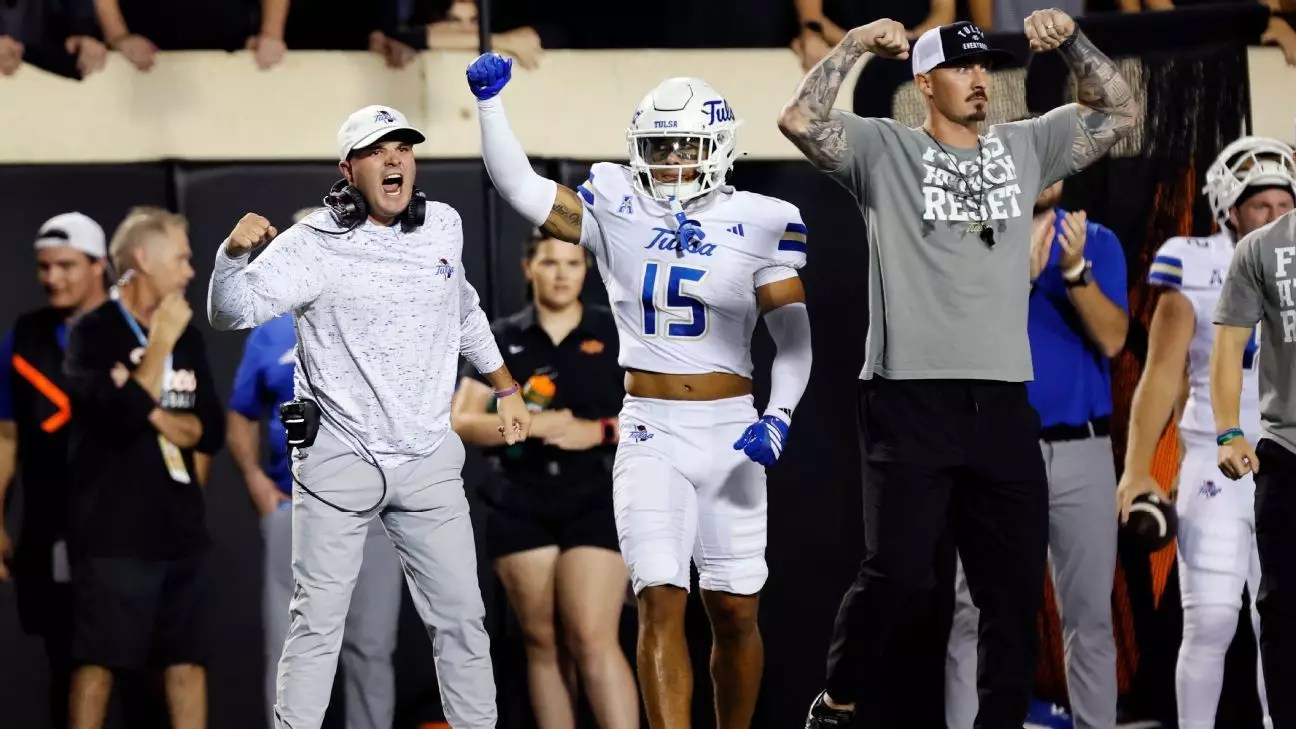In the realm of college football, victories often seem predestined by reputation, resources, and historical dominance. Yet, the recent victory of Tulsa over Oklahoma State shatters those assumptions, revealing uncomfortable truths about resilience, leadership, and the often-overlooked power of strategic innovation. This win, Tulsa’s first in Stillwater since 1951, is more than a mere upset—it’s a stark reminder that perseverance and ingenuity can defy ingrained disadvantages. For fans, coaches, and administrators, it exposes the fragility of established hierarchies and underscores the importance of humility and adaptive leadership in competitive sports—and by extension, in life itself.
This game exemplified how underestimated teams triumph not solely through talent but through mental toughness and tactical audacity. Tulsa, a team considered an outsider, outcoached and outplayed a complacent Oklahoma State, which has been faltering for years. The defeat leaves the Cowboys—a program with a storied history—facing uncomfortable realities about their decline. It is a lesson that even the most dominant institutions are vulnerable when they neglect innovation, underestimating their opponents’ grit and adaptability.
Leadership Under Pressure: Tulsa’s Rise from the Shadows
The real story emerges from Tulsa’s underdog journey—highlighted by standout quarterback Baylor Hayes and disciplined kicker Seth Morgan. Hayes, a redshirt freshman, embodies the emerging potential of overlooked talent. His composure, completing 23 of 36 passes without an interception, challenges the narrative that experience always trumps raw ability. It signals that fresh perspectives and willingness to take risks can disrupt the status quo and energize a struggling program.
Similarly, Morgan’s unerring precision with four field goals exemplifies focus, trust, and strategic patience. Their combined performance underscores a crucial lesson: leadership—whether on the field or in broader society—demands resilience, confidence, and a willingness to adapt in the face of adversity. Tulsa’s coaching staff, led by Tre Lamb, demonstrated that innovative game plans and strategic flexibility can overturn long-standing disadvantages. Their willingness to embrace unconventional tactics and invest in talent development offers a blueprint for organizations across all sectors.
In contrast, Oklahoma State’s historic woes—going 0-9 after losses since last season—highlight how complacency and overconfidence can be deadly. Their inability to adapt quickly or readjust during the game reflects a broader failure to foster agility in leadership structures. The Cowboys’ downfall is a somber warning that assuming past glories will sustain success is a dangerous mindset, especially when teams fail to innovate tactically or strategically during crises.
Strategic Innovation: The Key to Lasting Success
Tulsa’s victory was underpinned by strategic innovation that outmaneuvered Oklahoma State’s defensive assumptions. The Golden Hurricane exploited gaps early on, as seen in their successful shot at outcoaching a team purportedly better resourced. This approach demonstrates that in fields driven by constant change, static strategies inevitably lead to stagnation.
The effective execution of a disciplined game plan, combined with smart adjustments—like taking advantage of Tulsa’s quarterback mobility and Morgan’s long-range field goals—illustrates that innovation is not solely about new ideas but about courageous application. Tulsa’s coaching staff prioritized mental toughness over brute strength and refused to capitulate to conventional expectations of football dominance. Such leadership qualities are universally applicable: organizations that lean into strategic agility while fostering a culture of resilience are better poised to weather unforeseen challenges.
Oklahoma State, caught in a cycle of complacency and entitlement, illustrates the perils of stagnation. Their inability to respond to Tulsa’s aggressive tactics exposes a broader societal truth: systems built on comfort rather than innovation are inherently fragile. The game’s final moments, with Gavin Freeman pushed out of bounds at the 10-yard line, encapsulate how even the most meticulously constructed plans can unravel when adaptability isn’t prioritized.
Lessons for Society at Large
This football upset reverberates beyond the gridiron, offering harsh but necessary lessons on humility, strategic flexibility, and leadership accountability. It underscores that no institution—no matter how dominant or historically revered—should become complacent. Real strength lies in recognizing vulnerabilities, nurturing emerging talent, and daring to challenge orthodoxies.
In our broader societal context, this game serves as a wake-up call. Whether in politics, business, or community leadership, the tendency to uphold the status quo can be a trap that blinds us to genuine innovation and growth. The underdog victory encourages a mindset shift: embracing change, valuing resilience, and fostering adaptive leadership are essential for long-term success. Just as Tulsa’s victory was a product of strategic courage and mental tenacity, so too must organizations be unafraid to challenge entrenched beliefs and pioneer unconventional solutions to persistent problems.
This isn’t about romanticizing underdogs but about recognizing the underlying principles that empower them—principles leaders would do well to adopt: humility before challenges, courage in innovation, and resilience in the face of setbacks. Only then can true progress be made in a world where complacency is often mistaken for stability.

